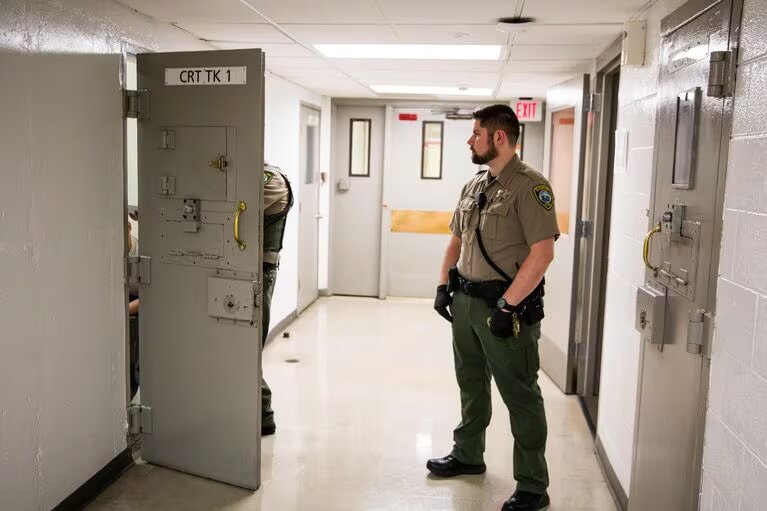A ruling by a federal judge targets those in custody without attorneys, leaving thousands of Oregonians charged with crimes on their own.
By Conrad Wilson / opb.org / November 9, 2023
Oregon has a massive shortage of public defenders, meaning the state is routinely violating the constitutional rights of low-income people charged with crimes.
Last week, a federal judge ruled that Oregon must provide defense attorneys to anyone in jail, within seven days, or release them. But that doesn’t solve the problem for thousands more who are out of custody and don’t have a lawyer.
Those defendants are often left to navigate the legal system on their own.
In December 2022, Crista Jean Davis appeared before Douglas County Circuit Court Judge Robert Johnson.
“I’m surprised to see you here without an attorney for a preliminary hearing,” Johnson told Davis. “Did you request a preliminary hearing?”
“I don’t know what’s going on,” Davis replied.
For the week before the court appearance, Davis had been in jail. Prosecutors alleged she drove several people to a home where they stole chainsaws and a generator, later sold to buy drugs. Davis faces felony burglary, theft and conspiracy charges.
Normally, a public defender would have met with Davis before the hearing. But Oregon’s threadbare public defense system left Davis on her own.
“I haven’t been in trouble in six or seven years, this is all different,” Davis said, holding back tears. “I’m my mom’s sole caretaker.”
Davis told Johnson she was confused and wanted to know if she could go home. While she had been charged with a crime, by law she was still considered innocent.
“I thought this was –,” Davis paused, “I would meet with an attorney.”
Johnson turned to the prosecutor, who replied that Davis’ bail was set at $20,000, which the prosecutor argued was appropriate, given the charges. Johnson turned back to Davis and asked if she was requesting a conditional release.
“I am,” Davis responded. “My family can’t afford that, your honor. I will stay put. If you look at my record — I know it’s not a very good record — I’ve stayed here. I’ve never ran. … I fell off the wagon. I hate to say it. I will do whatever I need to do just so I can go home to my mom while I wait for this — your honor. She has nobody else.”
“You need to be quiet now, ma’am,” Johnson said, cutting her off.
“I’m sorry,” Davis said.
“I don’t want you to say anything that gets you in worse shape than you’re already in,” the judge replied, before ultimately agreeing to let her out of jail, as long as she didn’t communicate with her co-defendants or the victims.
Davis’ case remains unresolved. She’s still without a lawyer, one of more than 2,525 people in Oregon currently charged with crimes who do not have an attorney.
Over the summer, Davis was part of a lawsuit brought by Oregon’s federal public defender.
“We filed this federal habeas petition to attempt to breathe some life into the Sixth Amendment,” Fidel Cassino-Ducloux, Oregon’s Federal Public Defender told OPB in August, after his office sued Washington County for holding people in jail without a defense attorney.
Cassino-Ducloux acknowledged that Oregon has tried to find funding and other ways to address the public defender shortage.
“I commend them for that,” he said. “However, you can’t violate people’s constitutional rights while you’re trying to fix the problem.”
Last week, U.S. District Court Judge Michael McShane agreed, and ordered that the state must provide a person in custody a lawyer within seven days of their first court appearance, or the sheriff of the county where they’re held must release them from jail.
Oregon still doesn’t have anywhere near enough lawyers, meaning McShane’s ruling won’t help those such as Davis, or Alex Sarat-Xotoy.
Last year, Sarat-Xotoy was charged with felony sex abuse after an altercation with his wife. Without an attorney, there’s nobody doing the basic work of mounting a legal defense for him — tasks such as interviewing potential witnesses or looking for additional evidence. The case, and any sense of closure for victims or others involved, is being delayed.
In August, Sarat-Xotoy appeared before Washington County Circuit Court Judge Kathleen Proctor. It had been more than nine months since he was charged and little had been done on his case.
“I still don’t have an attorney for you,” Proctor said in court. “But you are at least not in custody at this point. Are the conditions of your release going OK?”
Speaking through an interpreter, Sarat-Xotoy asked the judge to give him some flexibility with his pretrial release.
“I know it’s not the same to be in custody,” he said. “But the restrictions I have are really limiting me. I can’t go to stores. I can’t go grocery shopping.”
“Yes, that’s true,” Proctor replied.
“It’s affecting me,” Sarat-Xotoy stated.
“That’s true,” Proctor replied, again.
“Would you lift the restrictions?” Sarat-Xotoy asked.
“No,” Proctor said.
In September, in front of a different judge, the news was the same. This time, Sarat-Xotoy told Washington County Circuit Court Judge Eric Butterfield that it was coming up on one year since he was charged and he still did not have a lawyer.
“I don’t know if the state is acting in accordance with the Constitution,” Sarat-Xotoy said through an interpreter. “[How long] do I have to continue waiting in order for the state to give me an attorney?”
“Unfortunately, I don’t know the answer to your question,” Butterfield replied.
On Monday, Proctor appointed Metropolitan Public Defender, a local public defense nonprofit, to his case.
FEATURED IMAGE: A Clackamas County sheriff’s deputy stands in the hall of the Clackamas County Jail on Tuesday, Jan. 22, 2019, in Oregon City, Ore. (Conrad Wilson / OPB)



